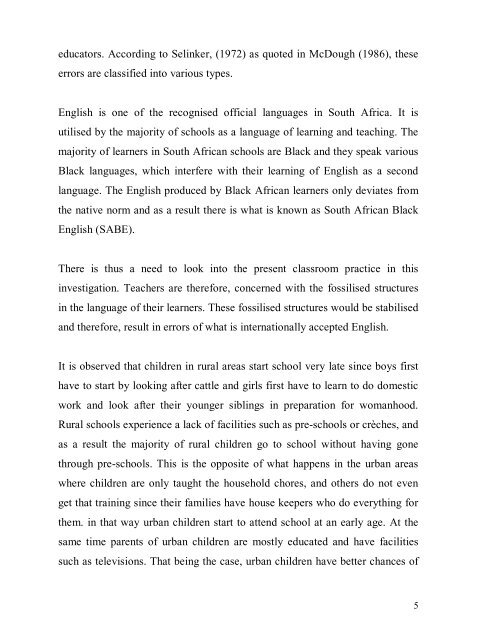error analysis: a study of errors committed by isizulu speaking ...
error analysis: a study of errors committed by isizulu speaking ...
error analysis: a study of errors committed by isizulu speaking ...
Create successful ePaper yourself
Turn your PDF publications into a flip-book with our unique Google optimized e-Paper software.
educators. According to Selinker, (1972) as quoted in McDough (1986), these<br />
<strong>error</strong>s are classified into various types.<br />
English is one <strong>of</strong> the recognised <strong>of</strong>ficial languages in South Africa. It is<br />
utilised <strong>by</strong> the majority <strong>of</strong> schools as a language <strong>of</strong> learning and teaching. The<br />
majority <strong>of</strong> learners in South African schools are Black and they speak various<br />
Black languages, which interfere with their learning <strong>of</strong> English as a second<br />
language. The English produced <strong>by</strong> Black African learners only deviates from<br />
the native norm and as a result there is what is known as South African Black<br />
English (SABE).<br />
There is thus a need to look into the present classroom practice in this<br />
investigation. Teachers are therefore, concerned with the fossilised structures<br />
in the language <strong>of</strong> their learners. These fossilised structures would be stabilised<br />
and therefore, result in <strong>error</strong>s <strong>of</strong> what is internationally accepted English.<br />
It is observed that children in rural areas start school very late since boys first<br />
have to start <strong>by</strong> looking after cattle and girls first have to learn to do domestic<br />
work and look after their younger siblings in preparation for womanhood.<br />
Rural schools experience a lack <strong>of</strong> facilities such as pre-schools or crèches, and<br />
as a result the majority <strong>of</strong> rural children go to school without having gone<br />
through pre-schools. This is the opposite <strong>of</strong> what happens in the urban areas<br />
where children are only taught the household chores, and others do not even<br />
get that training since their families have house keepers who do everything for<br />
them. in that way urban children start to attend school at an early age. At the<br />
same time parents <strong>of</strong> urban children are mostly educated and have facilities<br />
such as televisions. That being the case, urban children have better chances <strong>of</strong><br />
5
















